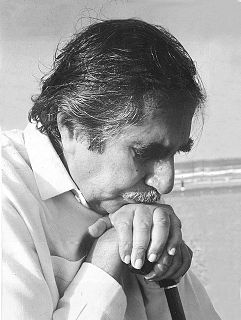 W
WAbdul Raheem Garhori was a Sufi saint and poet of the Sindh. He belonged to the Mangrio-family and his father's name was Sadullah Mangrio.
 W
WShaikh Ayaz SI born Mubarak Ali Shaikh was one of the prominent Sindhi poets of Pakistan in general and Sindh in particular. The author of more than 50 books on poetry, biographies, plays and short stories in both Sindhi and Urdu languages. His translations of Shah Jo Risalo, which was written by the 18th-century Sufi poet Shah Abdul Latif Bhittai, from Sindhi to Urdu language established him as an authority in his domain.
 W
WShah Abdul Latif Bhittai, commonly known by the honorifics Lakhino Latif, Latif Ghot, Bhittai, and Bhit Jo Shah, was a Sindhi philosopher, Sufi mystic, and poet, widely considered to be the greatest poet of the Sindhi language.
 W
WMakhdoom Bilawal Bin Jam Hassan Samo, was a sufi saint, philosopher and poet from Sindh, Pakistan. He is also referred as Makhdum Bilal or Bilali Makhdum.
 W
WUstad Bukhari Urdu born on 16 January 1930 and died on 9 October 1992 in Karachi was a prominent progressive Sindhi-language poet of Sindh, Pakistan. His creative contributions in the field of poetry changed the thoughts of millions of people and he got familiarity in whole Sindh and abroad. He was well known as poet of people and undoubtedly, he was, because he expressed his emotions in the language of common people. The Institute of Sindhology has opened a corner in its museum in his memory and honour.
 W
WAmir Bux Shar was a notable Sindhi-language poet and writer of Pakistan. In addition to his writing, he was also a social worker.
 W
WAttiya Dawood is a Sindhi poet, writer, feminist and activist. She was born in Moledino Larik She has been hailed as one of the most important feminist Sindhi writers of her time. Attiya uses her poetry to highlight the oppression of women in Sindhi society in the name of tradition. She has been writing poetry since 1980.
 W
WAyaz Gul is a prominent contemporary poet from Sindh, Pakistan. His works are in the indigenous Sindhi language.
 W
WImdad Hussaini is a Sindhi poet and an Urdu language writer of Pakistan.
 W
WIshaq Samejo is Pakistani poet, writer and literary critic of Sindhi Language.
 W
WDr. Abdul Jabbar Junejo was a Sindhi writer, poet, novelist, story-writer, critic, linguist, historian and musicologist of Sindh, Pakistan.
 W
WElsa Kazi (1884–1967), commonly known as "Mother Elsa", particularly in the Sindh province of Pakistan was a German writer of one-act plays, short stories, novels and history, and a poet. She was a composer and a musician of considerable achievement, involved in virtually every conspicuous branch of fine arts. Her paintings are often seen in many distinguished family homes.
 W
WKhawaja Muhammad Zaman of Luari was a sufi saint and poet from Sindh. His father, Shaikh Abdul Latif Siddiqi, was a descendant of first Rashidun Caliph Abu Bakr. Their forefathers had moved to Sindh in Abbasid era.
 W
WMakhdoom Muḥammad Hāshim Thattvī was an Islamic scholar, author, philanthropist, and a spiritual leader who was considered a saint by his followers. He was the first ever translator of the Quran in Sindhi language.
 W
WPir Hadi Hassan Bux Shah Jilani, commonly known by the title Hadi (1846–1900), was an eminent Sufi saint and poet from Sanghar in modern-day Pakistan who belonged to Qadiriyya Sufi order. He was born at Dargah Bhuro Bhawan Shah Jilani near Hyderabad Sindh and lived most of his life in Duthro Sharif Sanghar Sindh after traveling through Sindh to spread Iaspam and Sufism. He wrote his poetry in many languages, mostly in Sindhi but also in Urdu, Persian and other languages. The annual Urs of Hadi take place in the month of Jumada al-Awwal in Duthro Sharif Sanghar.
 W
WPir Sadar al-Din (Sadardin) or Pir Sadruddin was a fourteenth-century Nizari Ismaili da'i and is regarded as the founder of the Khoja Nizari Ismaili community, also called Satpanth.
 W
WSachal Sarmast or Sacho Sarmast (1739–1827), born Abdul Wahab Farooqi was a prominent Sindhi Sufi poet from Sindh in modern-day Pakistan.
 W
WSufi Budhal Faqeer (1865–1939) was a Sufi saint and poet, and disciple of Hizbullah Shah Rashdi. Faqeer's poetry was collected by his disciples and published in a book called Risalo Budhal Faqeer. Much of what is known about his life is through Sufi tradition, and separating it from historical reality is difficult.